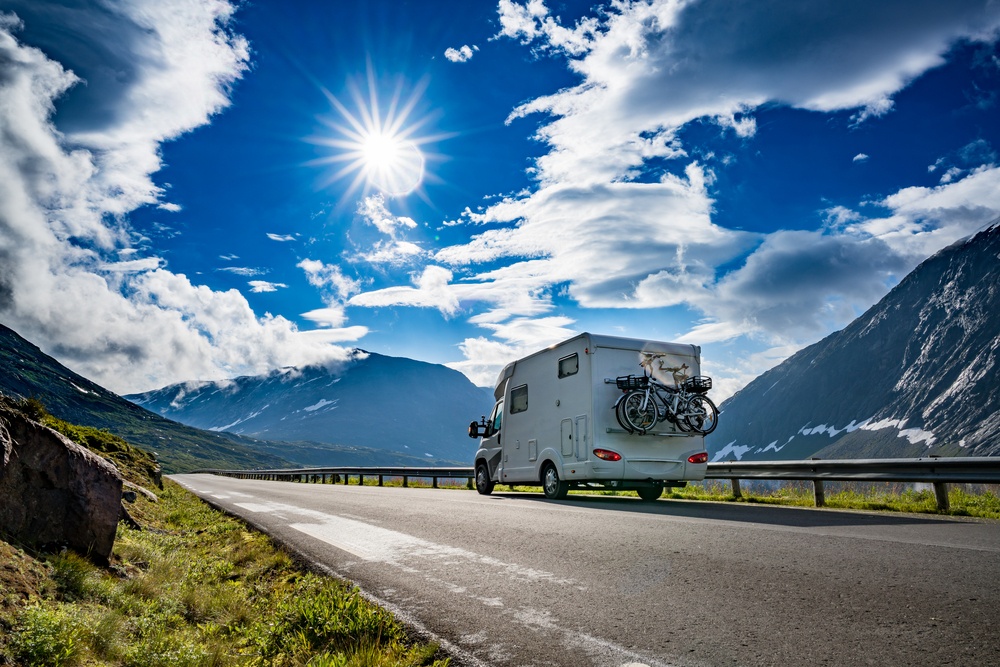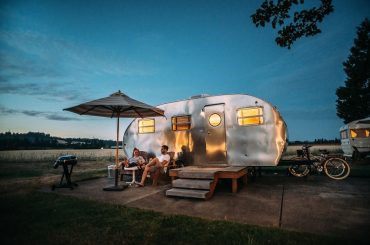Owning an RV has pros and cons. If you enjoy exploring, you may have wondered, “Is owning an RV worth it? Some have pondered this question before, picturing a pleasant camping trip or get-away. Maybe owning an RV even seems appealing to you when it didn’t before, given the new travel restrictions in place from the pandemic have made travel by plane take on new challenges and drawbacks.
Every person and their experience owning an RV is different, but there are some crucial universal factors to consider when looking into RV ownership. Here is our list of pros and cons to evaluate before purchasing an RV.
Pros of Owning an RV Motorhome
Freedom
People who own RV’s tend to be adventurers. Though researching RV’s benefits can be helpful you won’t understand the actual level of flexibility, comfort and freedom that these vehicles have to offer until you’ve been living in one yourself for some time. Being a vagabond able to move on to another town at a moment’s notice can be a very rewarding life leading to experiences and opportunities you’d never otherwise have.
Rather than being trapped in a small car for a long multi-day trip, you have all the conveniences of a small house on the road. Traveling by RV keeps you from ever having to get a cheap seedy hotel room, which can be frustrating and expensive. You also know first-hand when your bedsheets were changed.
RV Community
RV owners can be part of a tight-knit community. Places called RV resorts welcome owners to stay and network others with similar interests. Parking for weeks at a time, people often develop close relationships with others in the community. You’ll find that most of these individuals are friendly and easygoing. Some even travel around in caravans together, snow birding in places like Arizona during the winter and moving on to Florida in the summer.
The Whole Family Can Travel Together
Lots of people have to find dogsitters when they go on vacation as hotels won’t accept pets. Traveling in an RV is a different story. You have the freedom to bring the family dog or cat along for the ride. Standard RV’s can sleep around five people. However, larger coaches can comfortably house up to eight people. If you plan on bringing a pet, make sure you find a pet-friendly place to stay.
A Wide Variety of RV Types To Choose From to Fit Your Needs
From small tent trailers to herculean Class A motorhome coaches, RV’s come in all shapes and sizes. Finding the perfect size for your family may require careful consideration. If you plan on going on the occasional road trip during the summer, a smaller option might be more suitable. On the other hand, those planning to spend weeks on the road may benefit from a larger camper.
Easy Packing
Between bedding, kitchen goods, clothing and food supplies, there are many things to remember while packing for a long trip. Due to the large amount of storage capacity in RV’s this packing is made easier. Sometimes it can be helpful to buy a second set of everything just to keep in your RV. Have RV-specific toiletries, kitchen appliances, and clothing before venturing out can make your trips more frequent without the chore of needing to pack for every trip you take.
You’ll Be Motivated To Stay Active and Explore
Walking outside the house and peering at your RV can compel you to explore. Since you already invested into a vehicle meant for adventure, why wouldn’t you take advantage of it? Whether you choose a campsite or RV park, there are many excellent experiences to reap that are only possible when owning an RV.
Spending time outside can help increase your mood and health. Some studies even show that being outside can drastically improve your memory. Nature has always been an escape route for people suffering from anxiety and depression. Some studies even suggest that being in a forest can strengthen your immune system, too.
Cons of Owning an RV
The Real Cost
Each person has different preferences and needs when it comes to motorhomes. These campers can be as cheap as $1,000 or well over six figures. Choosing an RV that costs too much for your personal finances can lead to unpleasant experiences down the road. Acquiring a loan to finance a new RV is rarely a good idea as brand new RVs drop in value the moment they come off the lot and unless it is an Airstream may never recover their full value.
Adding to the vehicle’s price is a variety of additional costs, including maintenance, vehicle registration, and of course fuel. If you’re looking to travel to campgrounds, be ready to pay campground fees as well. You may find you spend more money on things like kitchenware and replacement sewer hoses than you originally expected to.
Health Concerns
Traveling in an RV can be risky for people with underlying health conditions. With big coaches breakdowns can happen and are possible, leaving you stranded by the side of the road in extreme weather conditions such as a desert. People can also place themselves far from medical facilities, rendering them incapable of getting help in an emergency. You’ll want to purchase your own medical supplies for this reason and be well stocked up in case of any emergencies.
Those with back problems and arthritis might not enjoy the experience of living in an RV. RV’s tend to produce lots of vibration when driven, which can aggravate these symptoms. For most people the interior of campers is a lesser-known environment compared to their homes. This unfamiliarity makes it easier to hit your head, fall, stub a toe, etc. While most of these injuries are small, some can be serious.
Parking
Parking is a huge area of concern when it comes to RV’s. Wherever you drive it’s crucial to find a suitable place to park overnight. Though they cost money, campgrounds welcome RV’s and provide a trustworthy location.
A riskier option is settling in uncharted territories such as a Walmart parking lot. Camping out in parking lots should be done with caution because you can easily get fined. Another possibility you can choose is an RV parking lot, which costs anywhere from $20 to $90 per day, depending on location.
Insurance
Just like other vehicles an RV requires insurance. The average cost of insurance on any kind of RV ranges from $500 to $1,000 a year. Some of the featured insurance brands are Progressive, National General and Good Sam. Figure out which RV insurance plan suits your family best to find the ideal brand.
Challenging To Drive
Traveling with any kind of RV can present many blind spots, which can make it challenging to maneuver narrow roads and sharp turns. Smaller RV’s are easier to control but if you’re thinking of buying a massive coach motorhome be prepared to undergo a lot of practice to perfect your skills. This also applies to travel trailers, too.
RV driving schools can be a safe avenue to ensure that you know how to drive one first. Rather than you doing all the work, a partner should also possess fluent driving skills. A two-day driving course can cost up to $700.
Feeling Of Being Cramped
Even in the largest of RV’s you can still find yourself feeling cramped or even claustrophobic. Sometimes sharing one small bathroom is challenging with multiple people living in the RV, especially in a large family. Elongated periods without privacy can be unappealing for those who enjoy alone time.
Vulnerable To the Extreme Weather
There is a common misconception that RVs are safe from the elements. In extreme weather they can be a dangerous, as many RVs are not as well insulated as they could be. In extreme cold you’ll need to have a heat source and in extremely hot desert environments you’ll want to be able to use an air conditioner. You also have to keep in mind that just as with a house, water pipes can freeze and become damaged in extremely cold places.
Many RV enthusiasts recommend always having a shelter in mind in case of harsh conditions like storms. Emergency weather radios are also helpful tools if there’s no phone service.
Sewage
One of the least attractive qualities in the world of RV campers is sewage management. The vehicles and trailers have their own plumbing system and store sewage in a place called a black water tank, which holds up to a week’s worth of waste with a family, although most tanks can hold a month of usage if you’re a solo camper. Taking care of the tank requires special attention to maintain its cleanliness and good operation. As the plumbing is basically just a hole over the toilet every time you flush you can get a nasty whiff of the smells from the sewage tank, although they generally are air tight when closed.
There are specific chemicals you can buy that will aid the breakdown process of the sewage that can reduce the smell whenever you flush but it’s always one of the less pleasant aspects of owning an RV motorhome or travel trailer.
RV’s Can Be Poorly Built
People on the internet voice many complaints about the inferior quality of some RV’s, including loose screws, faulty electrical wiring, and poor finishes. Among the endless RV brands there is a wide range of workers’ skill levels, leading to different quality levels in production. In attempts to save money some manufacturers frequently cut corners, leading to issues down the road. So you have to really do your research into the brand and model of RV that you buy in order to avoid purchasing a lemon.
Conclusion
Though they are costly, RV’s are an asset to those who value adventure and are financially stable. Campers require lots of work to maintain and as well as a dedicated storage place. With spacious interiors compared to cars, RV’s open up a possibility for traveling within a home.
If you value the benefits over the drawbacks, a camper can be an excellent tool for exploration. Many people ponder to themselves, “Is owning an RV worth it?” Take some time to evaluate these aspects and determine whether an RV is right for you.




